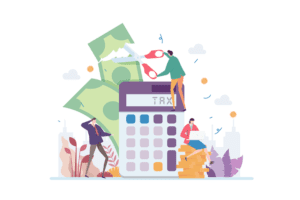
Although individual circumstances will vary, it may be wise to allocate a portion of your income each month to retirement savings, life insurance, or longer-term financial goals such as buying a house or paying for college. In doing so, there are many resources that can be helpful, ranging from free online educational resources to professional financial planners. The Internal Revenue Service (IRS) requires quarterly estimated tax payments to be filed by those who have income that is not subject to automatic withholding. The taxpayer then files the usual tax paperwork for the full year and pays the balance https://www.bookstime.com/blog/cash-flow-management-for-small-business due or requests reimbursement for an overpayment.
FHA loan limits
- In 2024, the maximum FHA loan amount you could borrow ranges from $498,257 all the way up to $1,149,825 in high-cost counties.
- The IRS recommends that everyone do a paycheck checkup in 2019, even if they did one in 2018, to determine if they need to adjust their tax withholding or make estimated tax payments throughout the year.
- If you’re moving to a new metro or state, it might be impossible to use the last real estate agent you worked with.
- If you are an employee, your employer withholds income taxes from each paycheck based on a completed W-4 Form.
Instead of trying to make 1 lump sum payment, it’s recommended to make estimated payments by the quarterly due dates. For freelancers who are also working a salaried job, it might be possible to ask your employer to adjust your withholdings to cover any taxes you’d pay on freelance or project-based work. If you live in a state with income tax, remember that you might need to make estimated tax payments to your state as well.

When Are Estimated Tax Payments Due in 2025?
If you’re like most taxpayers, you receive salary and wages from your employer and never have to worry about making estimated tax payments. You can pay all of your quarterly taxes for the upcoming year by the first quarterly deadline of the year in April. But it might not be an accurate amount if you don’t know exactly how much you’ll make for the rest of the year—and that could lead to an underpayment penalty. Waiting estimated tax to pay until the end of the year could also result in an underpayment penalty—because you’ll have missed earlier quarterly deadlines to pay—plus interest charges.
Who has to pay quarterly estimated taxes?
- Others need to make these payments directly to the government in the form of an estimated tax, rather than waiting until the end of the year to pay when they file their annual tax return.
- Refinancing your FHA loan to a conventional refinance loan can help you ditch your loan’s costly mortgage insurance premiums.
- You may want to consider automating your savings goals too—a feature that many banks offer in their mobile apps or online accounts to make saving easier.
- We also tested the following shoe bags with the same pair of sneakers, heels and ankle boots (all in a women’s size 8) to see how they fared during the packing and unpacking process.
- If you have little or no income tax withheld from wages and earn significant other income, you may need to make quarterly estimated tax payments to the Internal Revenue Service (IRS).
If you didn’t pay enough tax throughout the year, either through withholding or by making estimated tax payments, you may have to pay a penalty for underpayment of estimated tax. There are special rules for farmers, fishermen, and certain higher income taxpayers. Please refer to Publication 505, Tax Withholding and Estimated Tax, for additional information. Neglecting to make your required estimated tax payments can lead to a big tax bill when filing your tax return, potentially causing financial hardship or even bankruptcy. You can avoid any penalties if your withholdings and payments equal at least 90% of this year’s total tax or 100% of last year’s tax (110% if your adjusted gross income exceeds $75,000 for singles or $150,000 for joint filers). The extended due dates apply to most federal tax returns and payments, including those for income taxes (including estimated tax payments), payroll taxes, and excise taxes.
Ask your last agent for a referral
- If you think you’ll need the full promotional period to meet the minimum, make sure you have the right deadline.
- Lenders are constantly repricing their mortgages to account for changes in inflation, unemployment, and other economic factors that affect investor demand for mortgage-backed securities.
- “I definitely think that there’s a lot of opportunity to shop, to get lower interest rates that are going to actually be closer to what you would find on a primary mortgage from some providers,” he says.
- According to Turo, car insurance provided through a credit card typically excludes peer-to-peer rental platforms; they only cover vehicles rented through a qualifying rental agency.
- For most people, buying a house happens on a timeline dictated by a life event such as a new job, a marriage or a baby.
- If you delay your first estimated tax payment beyond the typical April 15 deadline, you should make payments as soon as possible to minimize penalties.
You need to estimate the amount of income you expect to earn for the year. If you estimated your earnings too high, simply complete another Form 1040-ES worksheet to refigure your estimated tax for the next quarter. If you estimated your earnings too low, again complete another Form 1040-ES worksheet to recalculate your estimated tax for the next quarter.

Calculate your income

Even if you anticipate a refund when you eventually file your return, the IRS may penalize late or insufficient estimated tax payments. Learn when quarterly estimated tax payments are due, who needs to pay, and how to calculate them. While estimated tax payments are termed “quarterly,” the periods they cover are not equal. For example, the period for the payment due on June 17 spans only two months, while the one due Online Accounting on April 15 covers three months. It’s crucial to refer to the IRS-specified payment dates rather than relying on a general calendar. Also note that if a payment date falls on a weekend or holiday, the deadline shifts to the next business day.
